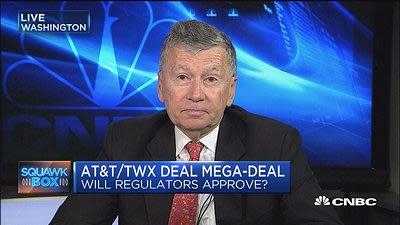Regulators, not Trump, get the final word on AT&T-Time Warner deal: Ex-FCC chairman

The president of the United States should not interfere in the government review process of mergers and acquisitions, former Federal Communications Commission Chairman Reed Hundt told CNBC on Tuesday.
Hundt, who was head of the agency during Bill Clinton's presidency, blasted the promise by Republican nominee Donald Trump to block AT&T (NYSE: T)'s proposed $85 billion buyout of Time Warner (NYSE: TWX).
"This is still another case of Donald Trump having a unique view about how our system works," Hundt said in a "Squawk Box" interview.
If Democratic nominee Hillary Clinton were elected, he argued that she would favor "following the precedents that were set in the previous reviews, and one of them was the approval of Comcast (NASDAQ: CMCSA) and NBC, but with a lot of tough conditions."
While the Comcast-NBC deal was struck before the introduction of federal net neutrality measures, Hundt said the extensive conditions were in the spirit of promoting the free flow of content on the internet.
Whether the AT&T-Time Warner deal passes depends on the willingness of the companies to accept the expected conditions imposed by the Justice Department and the FCC, he said.
The proposed merger would bring together a wireless, broadband and satellite TV giant with a content powerhouse in movies and television.
For example, "suppose AT&T wanted to use what's called 'zero-rating,' meaning you buy the AT&T wireless phone and you can have all of the data that includes HBO that you want: something distinctive about an AT&T wireless service," Hundt said.
But, according to Hundt, the solution is not so easy. The former FCC chairman said that among federal regulators, zero-rating is still "an unresolved question," leaving ample room for disagreement in dealings.
Luckily for AT&T, Hundt said the fee for breaking off the deal is relatively small. "If AT&T doesn't like the [government's} conditions, they can walk away without paying an arm and a leg."
AT&T would pay Time Warner $500 million if the deal doesn't go through under certain conditions. But if Time Warner were to back out of the deal, the media giant has agreed to pay AT&T a $1.7 billion termination fee.
Christine Varney, whose law firm represented Time Warner in its negotiations with AT&T, told CNBC on Tuesday that the federal government is as concerned about innovation as it is about maintaining a competitive market, which she believes will help the deal pass.
A partner at Cravath, Swaine & Moore and the former head of the antitrust division at the DOJ, Varney said that regulators will understand that the deal is between two complementary companies, and that it will serve to benefit consumers rather than lessen the playing field and raise prices.
"The law and the facts here really dictate that you look at market power of the company before the transaction and the market power after the transaction. Before the transaction, AT&T is not producing world-class content, and before the transaction, Time Warner is not selling mobile service. So, post-transaction, what you have are two complements coming together," she said on " Squawk on the Street ."
Varney, who was a former commissioner of the Federal Trade Commission , said she is "100 percent confident" in the ability of federal regulators to analyze the deal based on the law and the facts, which she said uphold the companies combining.
Political noise plays an essentially inconsequential role in the government's serious factual review, Varney said.
"There was a case in the 1970s where somebody in the White House tried to interfere in a Department of Justice evaluation of a merger, and somebody ended up going to jail. So I can assure you that any reasonable White House is absolutely going to understand the limits between what they can do in the White House and what the DOJ does as part of a civil enforcement investigation," she said.
"Those lines are very clear, and DOJ will stick to the facts and stick to the law, and I am sure that a President Hillary Clinton will want them to precisely that," she added.
Disclosure: Comcast is the owner of NBCUniversal, the parent company of CNBC and CNBC.com.
More From CNBC
Top News and Analysis
Latest News Video
Personal Finance

 Yahoo Finance
Yahoo Finance 
